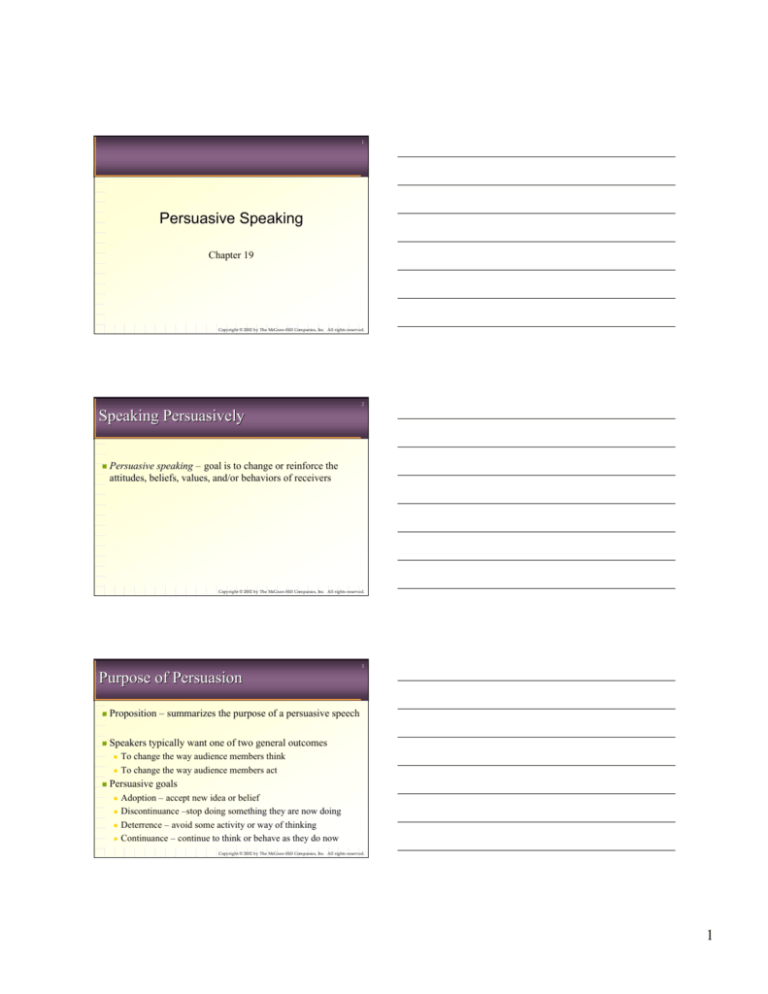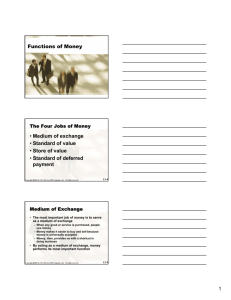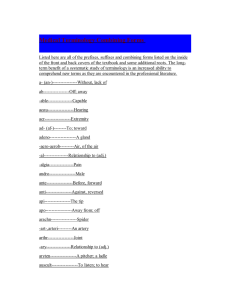
1
Persuasive Speaking
Chapter 19
Copyright © 2002 by The McGraw-Hill Companies, Inc. All rights reserved.
Speaking Persuasively
2
Persuasive speaking – goal is to change or reinforce the
attitudes, beliefs, values, and/or behaviors of receivers
Copyright © 2002 by The McGraw-Hill Companies, Inc. All rights reserved.
Purpose of Persuasion
Proposition – summarizes the purpose of a persuasive speech
Speakers typically want one of two general outcomes
3
To change the way audience members think
To change the way audience members act
Persuasive goals
Adoption – accept new idea or belief
Discontinuance –stop doing something they are now doing
Deterrence – avoid some activity or way of thinking
Continuance – continue to think or behave as they do now
Copyright © 2002 by The McGraw-Hill Companies, Inc. All rights reserved.
1
Types of Persuasive Speeches
Proposition of Fact
What is or what is not
Proposition of Value
4
The worth of an idea, person, or object
Proposition of Policy
What ought to be
Copyright © 2002 by The McGraw-Hill Companies, Inc. All rights reserved.
Identify Your Goal
Have a clearly defined purpose
You should be able to answer these questions:
What response do I want from my audience members?
Would I like them to think differently, act different, or both?
Which of their attitudes or beliefs am I trying to alter? Why?
5
Copyright © 2002 by The McGraw-Hill Companies, Inc. All rights reserved.
Know the Receivers You Are Trying to
Reach
Have some idea of how the audience members feel about
whatever change you are proposing
The more ego-involved the audience members are, the more
committed they will be to their current position, and the
harder it will be for you to affect them
6
Copyright © 2002 by The McGraw-Hill Companies, Inc. All rights reserved.
2
Understand Factors Affecting Your
Listeners’
Listeners’ Attitudes
Family
Religion
Education
Socioeconomics
Culture
Strong influence exerted by our families
Both believers and nonbelievers are affected by religion
The role of school has expanded and helps shape attitudes
Economic and social status both shape our attitudes
We shape our social institutions and are reciprocally shaped by
them
Copyright © 2002 by The McGraw-Hill Companies, Inc. All rights reserved.
Understand Your Listeners’
Listeners’ Beliefs
7
8
Beliefs – confidence in the truth of something
Measured on a probable – improbable scale
Belief system – everything you agree is true
Disbelief system – all things you think are not true
Understand not only your listeners’ attitudes, but also their
beliefs
The more central a belief, the harder audience members will
work to defend it, and less willing they will be to change it
Copyright © 2002 by The McGraw-Hill Companies, Inc. All rights reserved.
Use Two Principles of Influence
Consistency – the desire to maintain balance in our lives by
behaving according to commitments already formed
Social proof – the determination of what is right by finding
out what other people think is right
9
Copyright © 2002 by The McGraw-Hill Companies, Inc. All rights reserved.
3
10
Reason Logically
Give your listeners logical reasons why they should support
what you advocate
Deduction – move from general to specific
Induction – move from specific to general
Causal reasoning – speculation about reasons for and effects
of occurrences
Reasoning from analogy – reasoning by comparison
Copyright © 2002 by The McGraw-Hill Companies, Inc. All rights reserved.
11
Reason Ethically
Ethical speakers do not employ logical fallacies
Most common fallacies speakers should avoid:
Argumentum ad Hominem
Red Herring
The False Division
Post Hoc, Ergo Propter Hoc (False Cause)
Argumentum ad Populum (Bandwagon Appeal)
Argumentum ad Verecudiam (Appeal to Authority)
Copyright © 2002 by The McGraw-Hill Companies, Inc. All rights reserved.
Gain Your Listeners’
Listeners’ Attention
Find ways to encourage your audience to listen to you
12
Compliment them
Question them
Relate your message directly to their interests
Surprise them by relating to them in an unexpected way
Work to hold their attention once you have it
Copyright © 2002 by The McGraw-Hill Companies, Inc. All rights reserved.
4
Make Your Listeners Feel As Well As
Think
Few people will change their attitudes or take action if they
are unmoved or bored
Compel your listeners to remember your ideas and proposals
13
Appeal to your listeners’ hearts as well as their heads
Build your speech on feelings as well as logic
Copyright © 2002 by The McGraw-Hill Companies, Inc. All rights reserved.
Evoke Relevant Needs and Issues
Balance – a state of psychological comfort on which one’s
actions, feelings, and beliefs are related to each other as one
would like them to be
Demonstrate to your audience that some current situation or
state of affairs has created an imbalance in their lives and
that you can help restore their balance
14
Make your message appeal to their needs and goals
Copyright © 2002 by The McGraw-Hill Companies, Inc. All rights reserved.
Maslow’
Maslow’s Hierarchy of Needs
15
Copyright © 2002 by The McGraw-Hill Companies, Inc. All rights reserved.
5
16
Promise a Reward
Make your listeners believe that your proposal will supply a
reward
People are usually preoccupied with how something will
benefit them personally
Remember that different audiences value different types of
rewards
Copyright © 2002 by The McGraw-Hill Companies, Inc. All rights reserved.
A Framework for Persuasive Speaking
17
Monroe’s motivated sequence – meets the needs of speakers
who desire to move audience members to action
Attention
Need
Satisfaction
Visualization
Action
Copyright © 2002 by The McGraw-Hill Companies, Inc. All rights reserved.
Becoming a More Credible Persuader
Credibility – the receiver’s assessment of the competence,
trustworthiness, and dynamism of a speaker
An audience’s assessment of your credibility can change
during your presentation or as a result of it
18
Initial – before you actually begin speaking
Derived – during your speech
Terminal – at the end of your speech
Copyright © 2002 by The McGraw-Hill Companies, Inc. All rights reserved.
6
Technology and the Persuader
19
The emotional power of virtual reality may become a
powerful, though ethically questionable, tool for persuasive
speakers
It is neither good nor bad in itself
How it will be used is what matters
Copyright © 2002 by The McGraw-Hill Companies, Inc. All rights reserved.
Delivering a Persuasive Speech
You must show a great deal of interest in and enthusiasm for
your topic
Be aware that audience members may object to what you say
20
Be prepared for opposing points of view
Consider the source of objections
Answer any argument in a professional manner
Maintain control
Copyright © 2002 by The McGraw-Hill Companies, Inc. All rights reserved.
7






